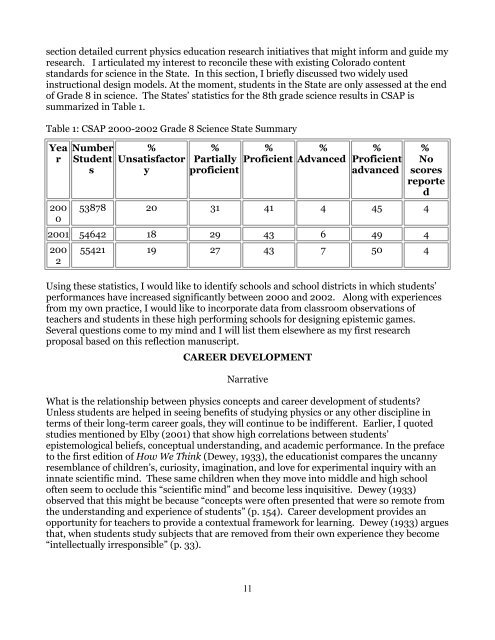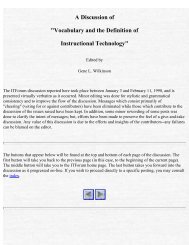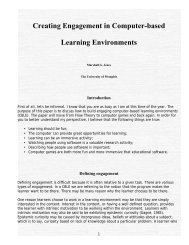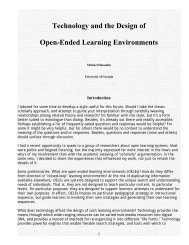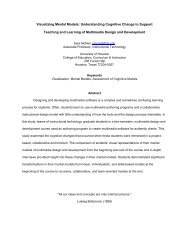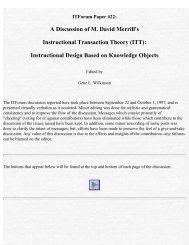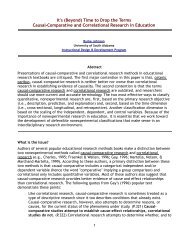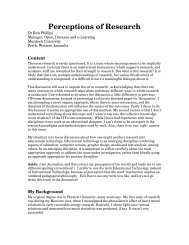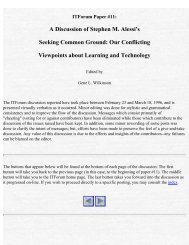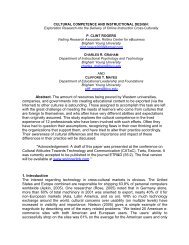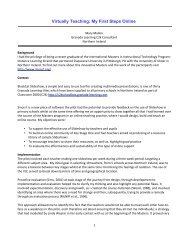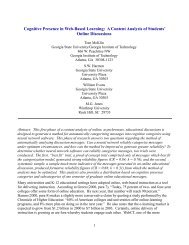SMART EDUCATION: BLENDING SUBJECT EXPERTISE WITH THE CONCEPT OF ...
SMART EDUCATION: BLENDING SUBJECT EXPERTISE WITH THE CONCEPT OF ...
SMART EDUCATION: BLENDING SUBJECT EXPERTISE WITH THE CONCEPT OF ...
Create successful ePaper yourself
Turn your PDF publications into a flip-book with our unique Google optimized e-Paper software.
section detailed current physics education research initiatives that might inform and guide my<br />
research. I articulated my interest to reconcile these with existing Colorado content<br />
standards for science in the State. In this section, I briefly discussed two widely used<br />
instructional design models. At the moment, students in the State are only assessed at the end<br />
of Grade 8 in science. The States’ statistics for the 8th grade science results in CSAP is<br />
summarized in Table 1.<br />
Table 1: CSAP 2000-2002 Grade 8 Science State Summary<br />
Yea<br />
r<br />
200<br />
0<br />
Number<br />
Student<br />
s<br />
%<br />
Unsatisfactor<br />
y<br />
%<br />
Partially<br />
proficient<br />
%<br />
Proficient<br />
%<br />
Advanced<br />
%<br />
Proficient<br />
advanced<br />
%<br />
No<br />
scores<br />
reporte<br />
d<br />
53878 20 31 41 4 45 4<br />
2001 54642 18 29 43 6 49 4<br />
200<br />
2<br />
55421 19 27 43 7 50 4<br />
Using these statistics, I would like to identify schools and school districts in which students’<br />
performances have increased significantly between 2000 and 2002. Along with experiences<br />
from my own practice, I would like to incorporate data from classroom observations of<br />
teachers and students in these high performing schools for designing epistemic games.<br />
Several questions come to my mind and I will list them elsewhere as my first research<br />
proposal based on this reflection manuscript.<br />
CAREER DEVELOPMENT<br />
Narrative<br />
What is the relationship between physics concepts and career development of students?<br />
Unless students are helped in seeing benefits of studying physics or any other discipline in<br />
terms of their long-term career goals, they will continue to be indifferent. Earlier, I quoted<br />
studies mentioned by Elby (2001) that show high correlations between students’<br />
epistemological beliefs, conceptual understanding, and academic performance. In the preface<br />
to the first edition of How We Think (Dewey, 1933), the educationist compares the uncanny<br />
resemblance of children’s, curiosity, imagination, and love for experimental inquiry with an<br />
innate scientific mind. These same children when they move into middle and high school<br />
often seem to occlude this “scientific mind” and become less inquisitive. Dewey (1933)<br />
observed that this might be because “concepts were often presented that were so remote from<br />
the understanding and experience of students” (p. 154). Career development provides an<br />
opportunity for teachers to provide a contextual framework for learning. Dewey (1933) argues<br />
that, when students study subjects that are removed from their own experience they become<br />
“intellectually irresponsible” (p. 33).<br />
11


